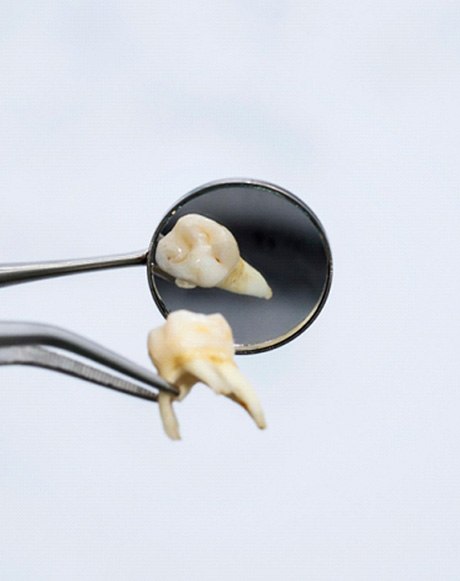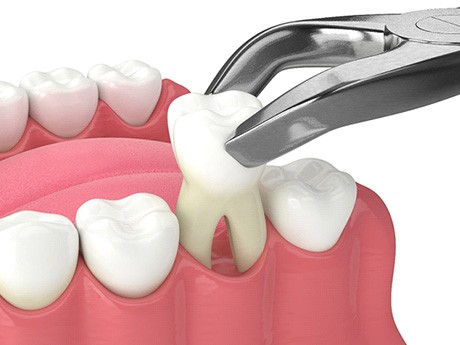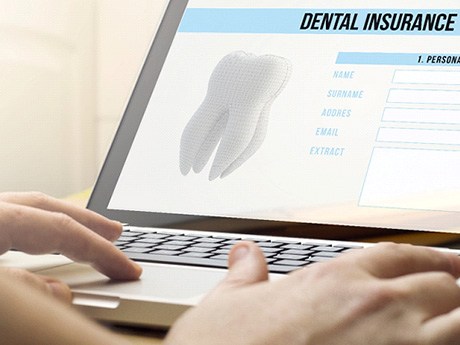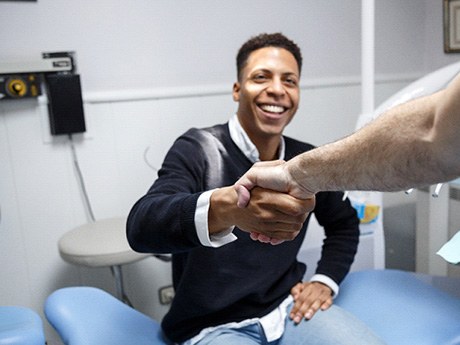Tooth Extractions – Huntsville, OH
When Teeth Are Beyond Saving
The idea of having a tooth extracted is never an inviting one, and our team will always try to help you avoid that situation with an appropriate restorative treatment. But what if the damage is simply too severe? In some situations, tooth extraction may be the only option remaining. With Dr. Grill’s help, you can have your teeth removed (and, ideally, replaced) without unnecessary discomfort or trouble. Give us a call right away if you’re worried that you may need an extraction soon.
Why Choose Northwest Family Dental of Huntsville for Tooth Extractions?
- Lifelike Replacement Options
- Sedation for Nervous Patients
- Gentle Dentist Who Cares About Comfort
Reasons Why Tooth Extractions Are Necessary

Some situations where a tooth extraction might be required include:
- Infection: The pulp inside your tooth could potentially become severely infected. This could lead to even more dire health issues if the problem starts to affect other parts of your mouth.
- Irreparable Damage: Cracked, chipped, or otherwise damaged teeth can often be repaired. However, if the tooth is too weak for a restoration, it may need to be removed.
- Overcrowding: Sometimes your teeth might be crowded too close together, and space needs to be created before certain treatments (such as Invisalign for orthodontic corrections) can be performed.
- Dentures: Dentures are often needed if you plan on replacing an entire row of teeth, but any teeth that are still in your mouth have to be taken out first.
If you’re not sure why tooth extraction is being recommended, don’t be afraid to ask our team; we want you to be fully informed when it comes to your care and why specific steps might need to be taken.
The Process of Removing a Tooth

After we’ve ruled out any other treatment options, we will determine what kind of extraction you require. Sometimes, the tooth just needs to be loosened with a dental elevator so that it can simply be taken out of its socket. However, there are cases where a surgical approach might be required, such as when a tooth is impacted or is so badly broken that it can no longer be seen above your gums.
Regardless of the type of tooth extraction being performed, step one will always be to numb your mouth. Also, sedation might be used if you’re nervous about the procedure (or have a fear of dentistry in general).
Tooth Extraction Aftercare

The aftercare instructions you receive after a tooth extraction may vary depending on how extensive it was, but there are a few tips that are always worth keeping in mind:
- Protect the blood clot that forms at the extraction site by avoiding activities that might cause it to move out of place, such as drinking through a straw or spitting.
- Don’t chew with the side of the mouth where the tooth extraction was performed, and stay away from hard foods for a while.
- When you go to bed, use a pillow to make sure that your head stays raised.
- Manage any pain you might be experiencing with ibuprofen and similar medications.
Understanding the Cost of Tooth Extractions

Tooth extractions are only recommended when necessary, so if you’re told that you need one, you should immediately start taking whatever steps you can to ensure that your treatment is affordable. An estimate can only be provided after our team has completed an examination of your mouth. In the meantime, though, here are some relevant factors that could influence the price of the extraction process and some tips for keeping your out-of-pocket costs under control.
Factors That Can Affect Tooth Extraction Cost

It may be tempting to think that all tooth extractions are the same, but the complexity of the treatment – and therefore, the overall cost – often depends on which tooth needs to be removed. You can generally expect a higher price tag for an extraction involving a tooth near the back of your mouth. And of course, it costs more to have two or more teeth extracted than it does to have just one tooth removed.
It’s also important to keep in mind that tooth extractions are often divided into two categories: simple and surgical. You may require a surgical extraction if your tooth has not fully erupted. As a result, you can expect the extraction process to cost more.
In addition to the price of the actual tooth extraction, you should also consider how much it might cost to fill the gaps in your smile. Dental bridges, dentures, and dental implants all come with a number of factors that could affect the amount you pay for them.
Does Dental Insurance Cover Tooth Extractions?

Dental insurance does often offer some coverage for tooth extractions. It’s common for dental insurance companies to pay around 50% of the total cost of the procedure, but don’t forget that factors like your deductible or your annual maximum could have an impact on the amount that you need to pay yourself. When planning any kind of dental work, it’s often a good idea to reach out to your insurance company to confirm that you understand your plan.
How to Make Tooth Extractions Affordable

Our practice offers a number of in-house membership plans to help our patients save money on their care. Each plan comes with a 15% discount for many of our services. On top of that, if you apply for CareCredit or Cherry financing, you can pay for your tooth extraction in monthly installments, meaning you won’t have to make room in your budget for the entire cost all at once. Talk to our team members for more information on how we can help make paying for a tooth extraction less of a stressful experience.
Tooth Extractions FAQs

Your permanent teeth are beautiful, durable, and designed to last for a lifetime; however, due to factors both in and out of your control, there are instances when one or more of your pearly whites need to be extracted! Rest assured, our team here at Northwest Family Dental of Huntsville is here to navigate you through this process with comfort, ease, and a wealth of knowledge. That’s why we’ve gathered a few of the most frequently asked questions we receive about tooth extractions, along with their respective answers, below. If you have any other concerns or questions, feel free to contact us today for additional information or assistance!
Does It Hurt to Have a Tooth Extracted?
Many patients are hesitant about any type of dental work, mostly due to concerns about potential pain and discomfort. Fortunately, whether you’re getting one tooth pulled or multiple, Dr. Grill’s first step will be numbing your mouth, to ensure that you don’t feel a bit of pain! You might feel some slight pressure during the actual procedure, but it’s nothing you should worry about. Following your appointment, it’s normal to experience some soreness, but it can often be managed with cold compresses, over-the-counter pain relievers, and other aftercare guidelines provided by our team.
What’s the Recovery for Tooth Extraction Like?
When recovering from a tooth extraction, you’ll be expected to abide by certain guidelines and restrictions while your mouth heals—failure to do so means your mouth is vulnerable to infections and other painful issues! A few things you should do include getting plenty of rest, keeping your mouth clean, and adhering to a soft foods diet. You’ll also need to take great care of the blood clot that forms over the now-empty socket. Lastly, you’ll need to keep your mouth clean too—typically, you can begin rinsing with salt water, brushing, and flossing within three days of your procedure, assuming Dr. Grill has given you the go-ahead!
Do Extracted Teeth Need to Be Replaced?
The bottom line is that it’s always going to be in your best interest to replace missing teeth, so as to avoid serious oral health consequences. Not to mention, a gap-filled smile, even if the gap is just a single tooth, can also negatively impact your ability to bite, chew, and speak, which can also hurt your self-esteem! Though it will depend on your individual circumstances and Dr. Grill’s opinion, options for replacing missing teeth include dental bridges, dentures, and dental implants—all of which are time-tested and proven to replace missing teeth and their functionality.
How Should I Prepare for My Tooth Extraction?
Preparing for your tooth extraction is just as important as following all of the necessary aftercare instructions! Before your procedure, let Dr. Grill know if you have any questions concerning the appointment, the recovery, or anything else. He’ll let you know how to handle the night before and the hours following the appointment. It’s a good idea to arrange for someone to take you home afterward since you won’t be able to drive due to the effects of local anesthesia—this includes picking up prescriptions and anything else you’ll need, so plan accordingly.

